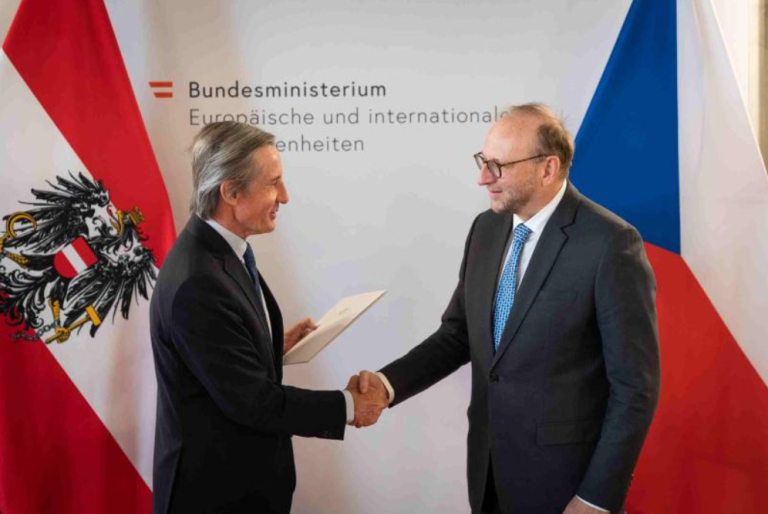Czech Ambassador Jiri Sitler meets Peter Launsky-Tieffenthal, Secretary of the Austrian Federal International Affairs Ministry, in August 2022. Credit: BMEIA / M.Kulhanek
Prague, Aug 23 (CTK) – Czech-Austrian relations are at their best ever, partly thanks to the joint steps taken in Prague and Vienna regarding the war in Ukraine, Czech ambassador to Austria Jiri Sitler told CTK yesterday.
Sitler took up the post about two weeks ago.
He also said the current closer cooperation of the Czech Republic with Austria is no replacement for the Visegrad Four, which constitutes the Czech Republic, Slovakia, Hungary and Poland.
Earlier this year, Czech Foreign Minister Jan Lipavsky and his Austrian counterpart Alexander Schallenberg visited Ukraine twice and Moldova once. The trips took place within the Austerlitz format, also including Slovakia alongside the Czech Republic and Austria.
Sitler said Austria’s interest in the Czech “know-how” in the eastern neighbourhood of the EU had contributed to the best ever relations between the two Central European neighbours.
“Austrians have found out that there is something valuable in our knowledge of the region to the east of us, that we are a partner from whom they can perhaps learn something,” he added.
It is equally important that in the past decade, “meticulous and diligent work” managed to eliminate controversial points arising from the joint history, especially from World War Two, from the political level of bilateral relations, Sitler said.
“We can focus on practical cooperation,” he added.
Vienna’s increased interest in cooperation with Prague also reflects the growing economic importance of the Czech Republic for Austria, Sitler said.
“Regarding the attitude to Russia, Czechs and Austrians used to have quite different attitudes. In Austria, there was always more openness towards Russia, but now the attitudes are converging,” he added.
In Austria, Russia’s invasion of Ukraine meant a certain “awakening.”
“In Austria, there is a growing understanding that EU enlargement does not only involve the Western Balkans, but that we also have to take interest in Ukraine or Moldova. We are doing this together,” Sitler said.
The shift of thinking in Austrian foreign policy related to the war in Ukraine is also reflected by the debate about neutrality, which in Austria is “a part of its identity” and as such still “untouchable.”
Sitler said Austrian had started interpreting neutrality differently.
“They are stressing that this is military neutrality, not neutrality in the sphere of politics or values,” Sitler said.
He said this was “quite a vital shift,” which has provoked negative reactions from Russia.
“In some things, we now have more similar views of security issues with neutral Austria than with some unnamed NATO members,” Sitler said.
The Austerlitz format, within which Czech-Austrian relations are now thriving, is no competition with or even replacement for the Visegrad Four, despite disagreement in the latter over its governments’ approaches to the Ukrainian crisis.
“The Visegrad Four has always had its periods of boom and downturn,” said Sitler.







